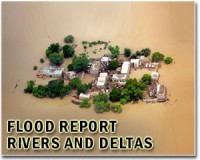| . |  |
. |
Washington (AFP) Jan 31, 2011 Last year's disastrous floods in Pakistan could have been minimized if European weather monitors had shared their data and it had been properly processed, US researchers said Monday. Catastrophic monsoon rains that swept through the country in July and August killed thousands, affected 20 million people, destroyed 1.7 million homes and damaged 5.4 million acres of arable land, experts have said. "This disaster could have been minimized and even the flooding could have been minimized," said lead author Peter Webster, a professor of earth and atmospheric science at the Georgia Institute of Technology in Atlanta. "If we were working with Pakistan, they would have known eight to 10 days in advance that the floods were coming." Using data from the European Centre for Medium-Range Weather Forecasting (ECMWF), Webster and colleagues found the floods could have been predicted if the data "had been processed and fed into a hydrological model, which takes terrain into account." Webster's research has been accepted for publication in a future edition of the journal Geophysical Research Letters, the American Geophysical Union said in a statement. But the London-based ECMWF, which includes 33 participating European countries, defended itself saying it "does not give out weather forecasts and weather warnings to the general public or media." "ECMWF provides numerical forecasts to its member and co-operating states and they are responsible to prepare forecasts for the public and advise the authorities in their own countries," ECMWF scientist Anna Ghelli was quoted as saying by the AGU. The AGU said the information did not reach the Pakistani people because of a "lack of a cooperating agreement between the forecasting center and Pakistan." "The major result of the study is that the heavy rainfall pulses throughout July and early August were predictable with a high probability six-eight days in advance," said an early release version of the paper. "If these forecasts had been available to the regions of northern Pakistan, government institutions and water resource managers could have anticipated rapid filling of dams, releasing water ahead of the deluges. A high probability of flooding could have been anticipated." Pakistan's own meteorological agency also did not forecast the flooding, the AGU said, of the research funded by the National Science Foundation. Webster said he spent five years working with Bangladesh on a flood-forecasting technique and helped organize a cooperating agreement between the ECMWF, the Asian Disaster Preparedness Center and the Bangladesh government. Subsequent flood warnings have helped save lives and up to one year's salary per farm. The entire startup cost for a similar system in Pakistan would be a few million dollars, and about 100,000 dollars per year to operate, Webster said.
Share This Article With Planet Earth
Related Links Bringing Order To A World Of Disasters When the Earth Quakes A world of storm and tempest
 Raging Bolivia river sweeps away bus, killing 34
Raging Bolivia river sweeps away bus, killing 34La Paz (AFP) Jan 30, 2011 At least 34 people were killed when a river in southeastern Bolivia burst its banks, sweeping away a passenger bus and a truck, authorities said Sunday. Bodies have been washing up on the banks of the Mollepunku River since the incident late Friday near the town of Pampahuasi, 700 kilometers (435 miles) southeast of the Andean nation's capital La Paz, police said. The passenger bus had b ... read more |
|
| The content herein, unless otherwise known to be public domain, are Copyright 1995-2010 - SpaceDaily. AFP and UPI Wire Stories are copyright Agence France-Presse and United Press International. ESA Portal Reports are copyright European Space Agency. All NASA sourced material is public domain. Additional copyrights may apply in whole or part to other bona fide parties. Advertising does not imply endorsement,agreement or approval of any opinions, statements or information provided by SpaceDaily on any Web page published or hosted by SpaceDaily. Privacy Statement |